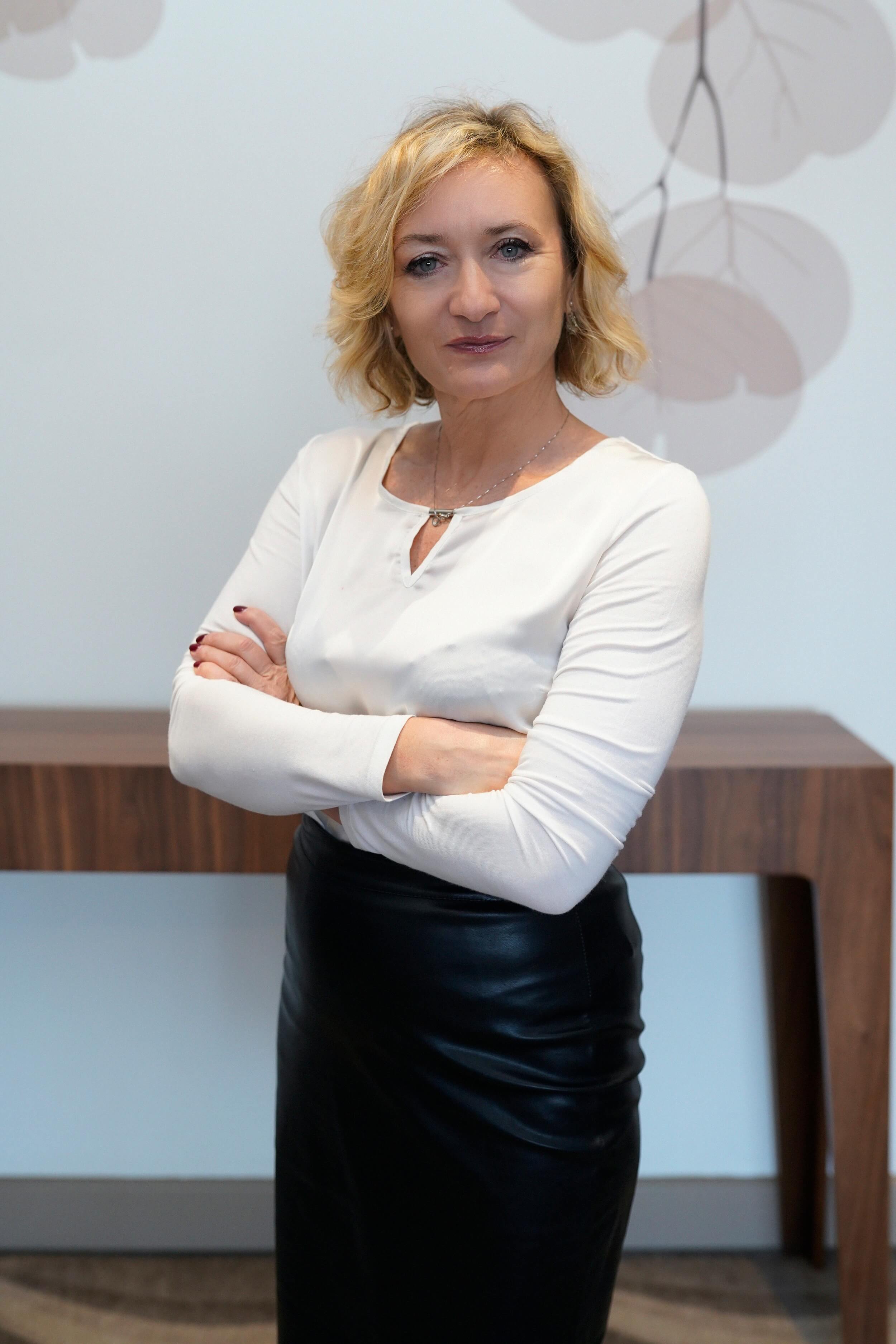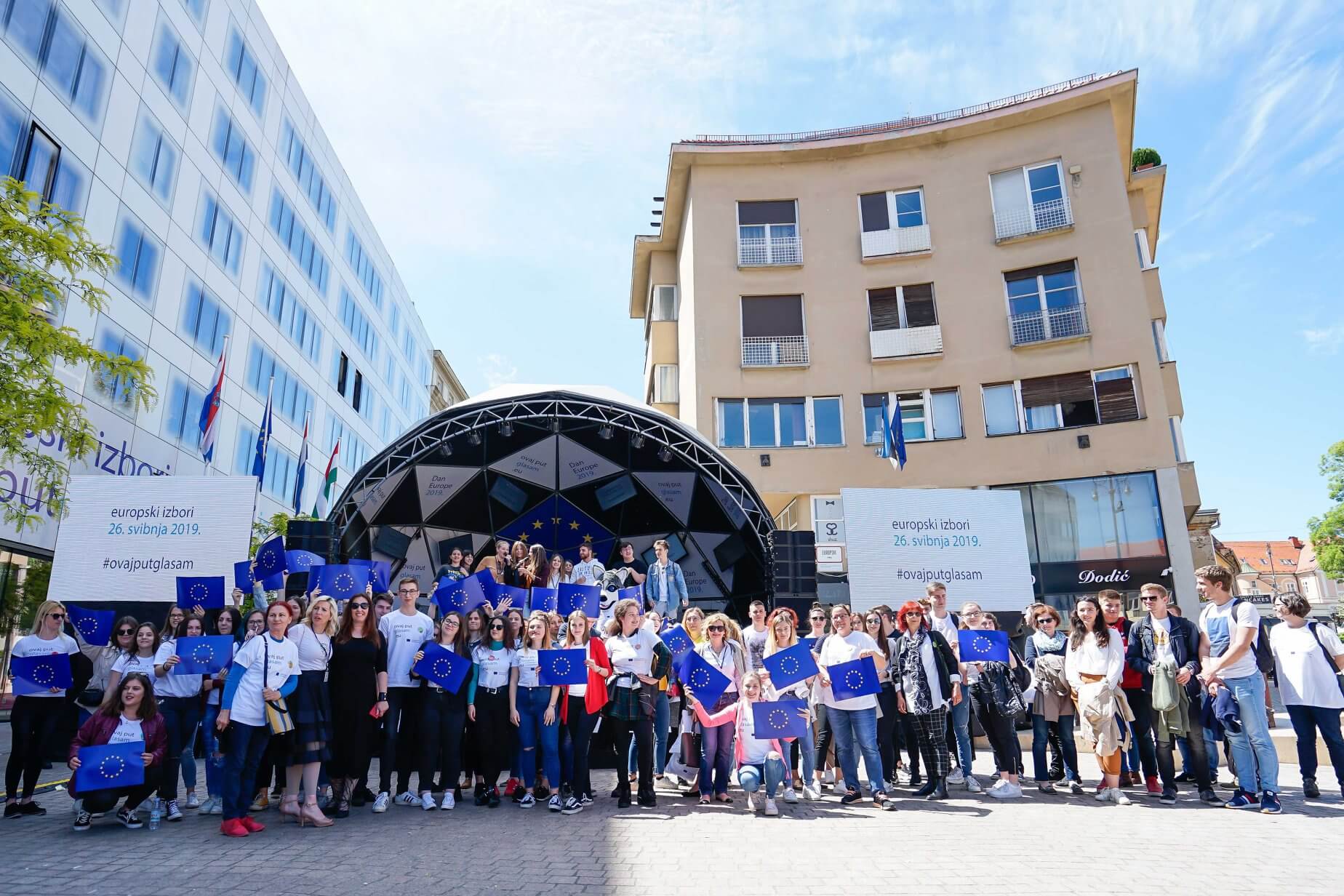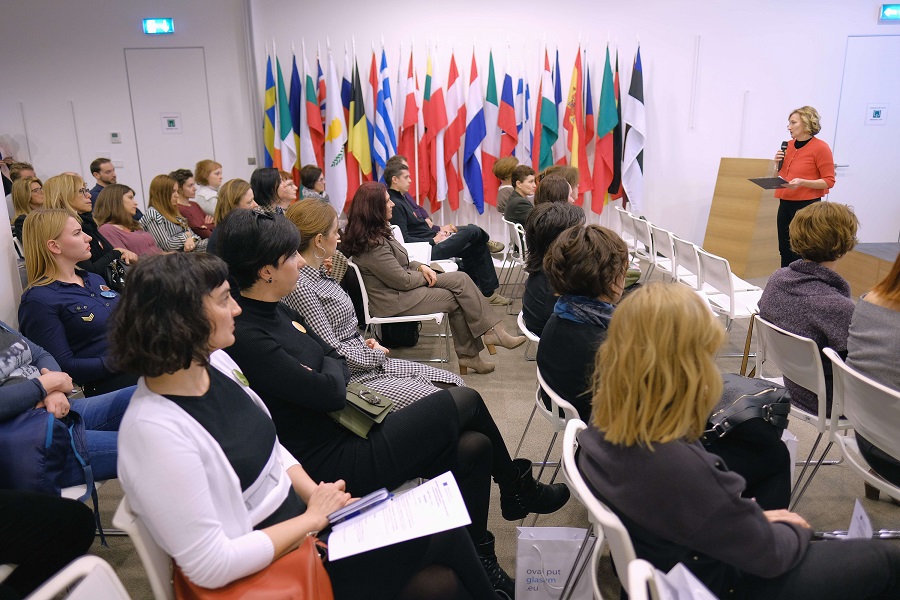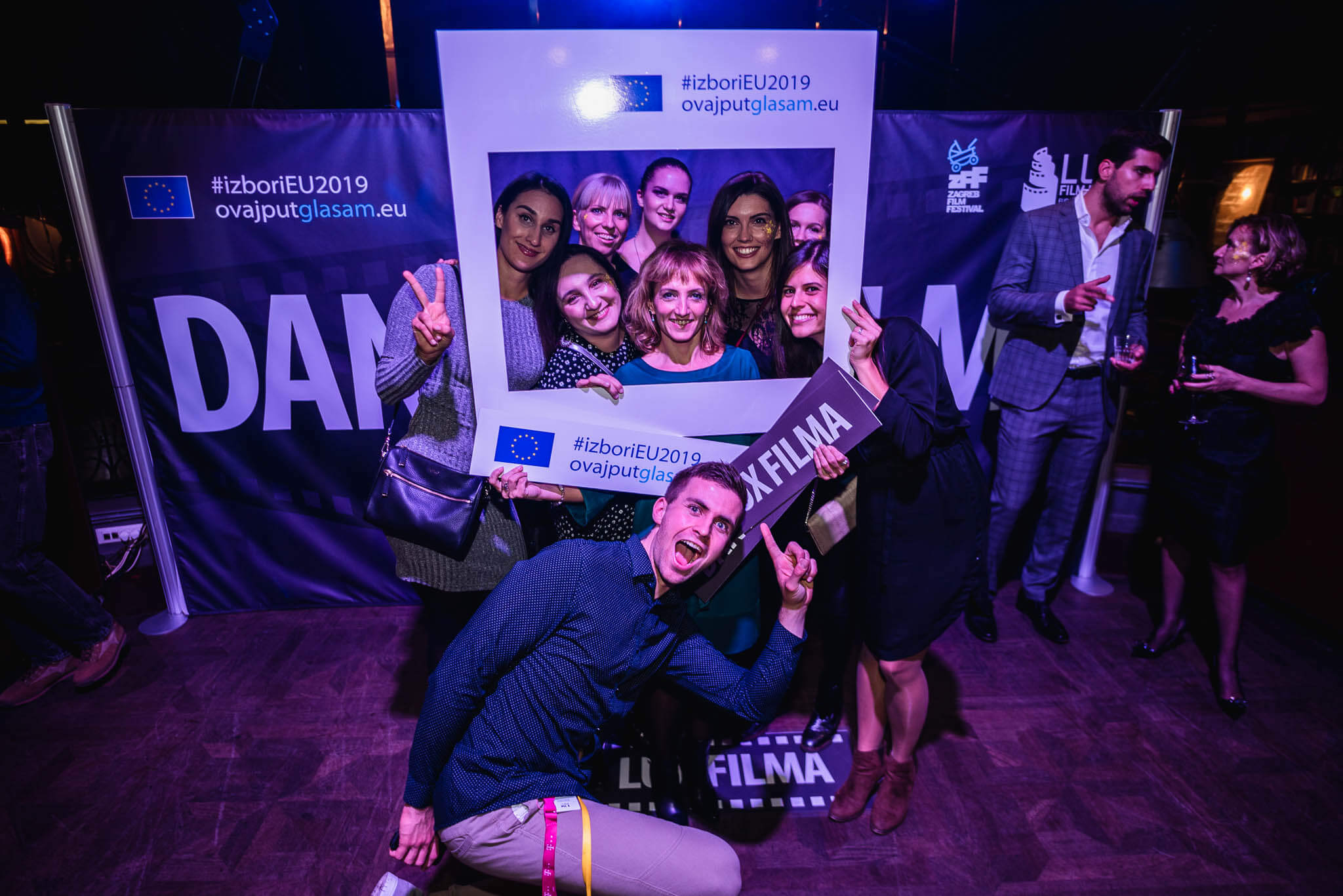European Youth and IT Industry Panel: Digital Osijek on Horizon
October 1, 2021 - The European Youth and IT Industry Panel, part of the European Future Conference, talked about the importance of the IT sector and AI technology. The host city of Osijek is already displaying fantastic results in the field as a digital Osijek becomes more and more of a reality.
The last day of September, which is the unofficial start of new victories and losses for the Croatian youth (due to the beginning of the school year and final deadline exams for students), has been completed with a suitable discussion on the future of new generations.
Osijek, the biggest city in the Eastern Croatian region of Slavonia, was the host of the ''Youth and the IT Industry Future'' panel, one of the thematics panels from the European Future Conference.
Along with the Croatian Parliament and Croatian counties, the European Parliament Office in Zagreb hosts thematic discussions in ten cities which are home to universities.
''The European Future Conference is a series of public debates that allows citizens to express their ideas and come up with suggestions for the reforms and future policies of the EU,'' explains the European Parliament Office in their press release.
They added that the centerpiece of the conference is a multilingual platform where citizens can exchange ideas, connect with each other, and have their say on burning issues outside of these organised events.
The panel in Osijek delighted the mayor, Ivan Radić, one of the opening speakers. Radić stated that Osijek has a lot to say and show when it comes to the IT sector as the city aims to rebrand as a place of excellence for this field, aiming for a more digital Osijek.
There is no better proof of that than the Osijek Software City Association, established in 2021 with the goal of promoting the IT sector towards the local community.
''Several leading IT companies in Osijek realised that the youth needs to be introduced to the IT industry in an approachable way,'' said Osijek Software City representative Ivan Ostheimer.
Thanks to their hard work, many local companies in Osijek now hire experts and produce quality software that can then be exported to the global market, in spite of the still challenging economic situation.
The background goal of the European Future Conference is to show people that European Parliament representatives aren't simply being hermits and hiding themselves in the EU Parliament in Brussels or Strassbourg. In that spirit, the Croatian MEPs Karlo Ressler (European's People Party) and Sunčana Glavak (Croatian Democratic Union) participated in the event (Ressler in person and Glavak via video link).
Ressler is the Vice President of the special EU Parliamentary Committee for artificial intelligence (AI). He stated at the panel the European Union currently has ongoing discussions on regulating this new technology. The goal is to find a balance that would use the potential of AI without stopping the industry, while also avoiding negative scenarios such as manipulation attempts that would damage people's lives.
Glavak pointed out how digitalisation now has a key role in every EU policy.
''The goal is for that at least 80% of the EU population to have digital skills by 2030“, said Glavak.
With the panel in Osijek demonstrating the current successes of the IT industry, the aim for a digital Osijek, and seeing the attendance of both political elites and professionals, it seems that this Eastern Croatian city is on a very good track.
Learn more about Osijek in our TC page.
For more about diplomacy in Croatia, follow TCN's dedicated page.
Friends of Croatia: European Parliament Office in Zagreb - First Contact with Croatian Citizens
May 6, 2021 - The third article in the series "Friends of Croatia: European Parliament Office in Zagreb", explores a small but dedicated office whose central focus is the 12 Croatian members of the European Parliament, as well as informing citizens and educating them about the European Union.
July 1, 2013, was a historic date for Croatian international integration as the country finally joined the European Union. The Union of developed European countries called for an enormous celebration on the main Ban Jelačić square in Zagreb. Many people saw different opportunities, and lots of opportunities were promoted by politicians ahead of joining. But, with almost eight years in the EU, could we actually list specific benefits and determine if Croatia is truly taking part in the „European dream“?
„EU membership made Croatia stronger, and there are many examples of the practical effects of it. I’ll mention two important ones: access to the common market and commitment and implementation of numerous political and economic reforms. Of course, one of the most visible immediate results of the EU membership was the end of customs controls at internal EU borders, which made crossings much smoother, with less hassle for people and goods. The removal of administrative and tariff barriers meant lower costs for businesses which – in combination with access to significant EU funds - translated into concrete economic advantages, helped the recovery, and increased exports. Also worth mentioning - the interest rates on loans have dropped, which lowered the costs of borrowing money for citizens and the business community, and this will be become even more pronounced once the country joins the euro. When it comes to Croatia’s contribution to the EU, along with its heritage, culture, and tradition that enriched the bloc, the country also brought its example and enthusiasm for the EU enlargement to the Western Balkans. Croatia is a vocal advocate of the European perspective for the region and considers the enlargement to be the most effective transformation mechanism that the EU has“, summarized Violeta Simeonova Staničić, the Head of the European Parliament Office in Zagreb, which is dedicated as the first contact between the European Parliament (EP) and citizens in Croatia.

Violeta Simeonova Staničić © European Parliament Office in Zagreb
The Office started its work in February 2013. Simeonova Staničić and three other associates put the whole project in a small space in the backyard of a former EU delegation. Describing the team in 2013 as the „EP Delta Force“, Simeonova Staničić recalled the difficulties of their early engagement. „It was difficult to operate properly and to be visible as the country was not yet a member state, so we were not able to function as an official liaison office. We couldn't even do a proper information campaign for the first EU elections when Croats decided who would be their first official members of the European Parliament“, she said.
While any EU organization is often perceived as big and loaded with people, the EP office in Zagreb counts six staff members. Being a complex organization which can often be misunderstood, their informative service on all thing EU is extremely important.
„People tend to have a lot of misconceptions when it comes to the competencies of the EU. In various policy areas, EU member states still hold primary responsibility. Health policy, for example. Social policies and retirement as well. In others, the EU is in the lead as it is ultimately more beneficial for all countries involved that decisions are made and actions taken with the interests of the entire Union in mind. Unfortunately, too often, we can see that when something good happens, usually national governments are credited for it, and if something is not going well, then Brussels naturally is to blame. But various crises and challenges have shown that the EU is at its finest when working as a team player, one community and a common market“, explained Simeonova Staničić. She added that when solidarity prevails, everyone gains a sentence that can underline the usefulness of international cooperation that is the EU.

2019 EP elections campaign "This time I vote" © European Parliament Office in Zagreb
The citizens recognize the help the Zagreb EP office can offer, and the Office gets lots of inquiries daily. Over time, the phone calls were more often replaced by e-mails, and first contacts are often made through the Office's social networks. 45,000 followers on Facebook and heavy engagements on Twitter and Instagram, and the quick response of the small staff are certainly admirable.
„We sometimes receive the bulk of documents as many people send us copies of their dealings with various institutions or judicial bodies. These types of problems are, of course, beyond our remit, but we will always try to help people to identify the right authority they need to address and contact in order to resolve their issues. We also get requests from various researchers and scholars who need help with finding certain data and material important for their work, or who need background information on a certain topic“, said Simeonova Staničić, adding the questions they receive are quite diverse.
The central part of the Office’s daily work revolves around 12 Croatian members of the Parliament. “Working with Croatian members of European Parliament is our daily priority and what we center our work around. We organise press conferences and events around issues they work on and committees that they are members of. We cooperate and communicate with them very successfully, as we foster a mutually beneficial relationship with them. As a rule of a thumb, we virtually have no event without a member of European Parliament present“, Simeonova Staničić explains.
The other part of the Office's role includes working with youth, media, and NGOs.
When it comes to the media, the Office informs daily about ongoing debates and discussions concerning the day-to-day activities of the European Parliament. They also strive to put important decisions in context and promote and explain the work of members of the Parliament. Before the coronavirus pandemic, the Office even invited journalists to follow the plenary sessions in Strasbourg to give them the opportunity to familiarise themselves better with the institution and its role in the EU decision-making process. In return, a steady community of journalists following EU affairs is formed in Croatia, and the expansion of reporters is something the Office always welcomes. The accent is put on working with local media, and several outlets managed to get co-finance for their projects by European grants.
Cooperation with NGOs depends on every project and topic of interest, but with the diversity of NGOs, some sort of collaboration with some organisation is always ongoing.
Regarding the youth, two projects stand out. „Our two most successful projects to date are Euroscola and European Parliament Ambassador School Programme (EPAS). Euroscola became so popular among all Croatian schools that whenever we had rounds of regional or national selections, we had over 100 schools competing for very limited quota to go to Strasbourg for a day at the European Parliament. Through Euroscola, we created a fantastic network of incredibly involved, active, hard-working schools all over Croatia. The EPAS program was launched in 2016, and today we have a wide network of over 50 high schools scattered across the country. They cooperate closely with us and follow the work of Croatian MEPs throughout the entire school year“, pointed out Simeonova Staničić.

Senior EP Ambassadors © European Parliament Office in Zagreb
Apart from media and citizens, the cooperation with the official bodies of the state is at a high level too.
„We collaborate very well with the Ministry of Foreign Affairs and other government institutions. For example, we cooperate when the delegation of the European Parliament comes to Croatia to work on a certain topic related to the upcoming legislation. This cooperation was particularly pronounced in the run-up to and during the first Croatian presidency of the Council of the European Union“, said Simeonova Staničić.
Particularly good collaboration is also made with the Croatian Parliament, a natural counterpart of the European Parliament. Currently, they are organizing the conference on the future of Europe, but also a more regular public award ceremony for the European Citizens’ Prize (established in 2008 by the EP to award individuals or groups that contributed to empowering European Integration).
„We are also regularly in contact with foreign embassies in Croatia, in pre-Covid times they were not only guests at our events, but also provided interesting speakers from their own countries for our panels and conferences “, described Simeonova Staničić the vast web of cooperation the Office has in Croatia.
Although being an Office for the European Parliament, they also help citizens by giving information on other EU institutions and how to get in touch with them. Informing citizens of ways to actively take part in European democracy, Simeonova Staničić describes as „the core of everything we do as an office of the most democratic institution of the EU“.
„European citizens can petition the European Parliament through our dedicated portal (European's Citizens's Initiative). This is a very transparent process whereby individuals or associations can submit a petition on a subject which comes within the European Union’s fields of activity and which affects them directly “, she explained.
Croatian perception and EU scepticism.
Perhaps it depends on the algorithm or just the loudness of its spokespersons, but it seems Euroscepticism is on the rise in Croatia. Still, Simeonova Staničić's view is much more optimistic and based on the public opinion surveys.
„Actually, the latest Eurobarometer survey shows that 78% of participants in Croatia state that EU membership is beneficial to Croatia, and 74% of those asked believe that COVID-19 economic recovery will be faster thanks to the EU. The majority of the respondents also answered that they have a positive image of the EU“, she said. She continued, however, that almost similar in size is the number of people who have neither negative nor positive opinions.
„For us, these 'non-committal' ones are really important and we try to reach them with our work. We need to raise their awareness about the advantages of the EU; thus, we mainly address young people, who are natural citizens of the EU, who are so accustomed to all the freedoms and opportunities the EU gave them that they take them for granted. They are not aware that there was a time, not so long ago, when these opportunities did not exist“, explained the Head of Office headmistress.
She added that entrepreneurs, managers, and small and medium business owners are most aware of EU benefits, making them natural partners and ambassadors with whom the Office also works really well.

Lux Party on election year © European Parliament Office in Zagreb
In similar rhetoric, Simenonova Staničić dismissed my thesis that young people recognize the easier traveling and working in other member countries as the only benefits of the EU. Firstly pointing out that „freedom of movement, freedom of choice, and the privilege to be employed without administrative barriers in any member state is one of the biggest values and benefits coming from an EU membership“, which means „escaping Croatia is not the right terminology“. Also, just as Croatians are leaving the country, other countries experience the same thing as their citizens are coming to Croatia.
„Due to the pandemic, we are actually witnessing more EU nationals temporarily moving to Croatia, as they work remotely. There is a large community of EU nationals which continues to grow, and it has a lot to thank Croatia’s EU membership“, argued Simeona Staničić.
Indeed, the reputation, and trust in the global community secured by EU membership, certainly contributed to the rise of digital nomads coming to Croatia, on which TCN regularly reports.
The Head of Office once again repeated how most of the benefits in EU Croatians regularly experience and are enjoyed without realizing it is thanks to the EU.
„When there is a new school lab or student housing being built with European funds, or when our young people go off to university or college and take for granted that they would go on an Erasmus exchange; when they don’t have to pay major tuition fees while studying abroad in some other EU member state but are charged the same rate as locals; when, together with other European countries like France, Belgium, and Germany, your government is part of negotiations on major questions of international importance: from health to peace and security...“, she listed various examples.
When asked to comment on Croatia's respect for human rights and European values, a question inspired by last year's cases the Republic of Croatia lost in the European Court of Human rights in Strasbourg, Siemonova Staničić refused to comment and instead explained that the role of the Office in Zagreb (as well as anywhere in Europe for that matter) is not political.
„We are here to provide support to members of the European Parliament in the exercise of their official mandate on the hand and to ensure that people understand actions of the Parliament and to encourage them to engage in the European democratic process on the other. This is important because citizens have tools to influence the legislative agenda of the EU directly “, explained Simeonova Staničić. For the already mentioned European Citizens Initiative, the EP must consider proposals with 1 million verified signatures.
Zagreb office for every EU citizen: Speaking English, Croatian, and six more languages!
As the EU is dedicated to being beneficial for every EU citizen from every country in the organization, so is the EP Office in Zagreb. Simeonova Staničić says the Office serves every EU citizen in Croatia, and whether - in person or online, they will address any issue or interest non-Croatian EU citizens may have and gladly respond and engage.
„In general, we work in the language of our host, which in this case is Croatian. Nevertheless, every European official is obliged to pass the employment exams in one of the working languages of the European Union and within two years to be able to work in 3 languages. In our case, our Office uses predominantly Croatian and English, but I am proud to say that my colleagues are proficient in many languages, and we can serve European citizens also in French, German, Slovenian, Bulgarian, Dutch, and Italian, without hesitation“, assured Simeonova Staničić.
The same service is also offered to Croatians in other EU countries, as every member state has an EP office. And cooperation being the keyword, the offices are frequently in touch as well.
"For example, the Parliament organized an online solidarity event called #EPASwithPetrinja where pupils from three member states (France, Ireland, and Spain) engaged with their counterparts from Petrinja and Zagreb to express solidarity in the wake of the disastrous earthquake that hit parts of Croatia and to comfort children their age from those hard-hit areas. At the event, we had members of the European Parliament from France, Ireland, and Croatia as speakers,“ Simeonova Staničić gave one example, adding that the cooperation is also there whenever there is a common topic or members of the European Parliament from different delegations work on major legislative or policy issues of interest to European citizens across the Union.

EPAS with Petrinja © European Parliament Office in Zagreb
The EP offices are always located in the capital city, and several countries also have the so-called „Antenna offices“ located in other larger cities such as Germany (Munich), France (Marseille), Poland (Wroclaw), Spain (Barcelona), and Italy (Milan).
„We do not have offices around the country. However, both our Office and the Representation of the European Commission in Croatia use the network of the so-called Europe Direct Information Centres. There are 10 of them in Croatia currently, and they are located in Petrinja, Slavonski Brod, Čakovec, Šibenik, Zadar, Osijek, Virovitica, Split, Pula, and Karlovac. They are not under our authority - we do not control them, and they are not a part of our structure. But they are our natural partners in various activities and often serve as local contact points“, explained Simeonova Staničić.
To conclude, the European Parliament Office in Zagreb is open to assist anyone that wants to receive any information related to the European Parliament - be it regarding its debates, ongoing plenaries, committee meetings, work of the members of the European Parliament, or general information concerning other European institutions.
The address of the Office is Augusta Cesarca 4 in the House of Europe on European Square in Zagreb, which is open from 9 am to 5 pm (however, due to the pandemic, the office is closed to the public until further notice). At that same time, you can reach them on the general E-mail This email address is being protected from spambots. You need JavaScript enabled to view it. or on the following phone numbers:
For public relations (citizen inquires):
Violeta Simeonova Staničić (Office head): + 385 1 4880 280 (E-mail: This email address is being protected from spambots. You need JavaScript enabled to view it.)
Janja Mateja Aleš (assistant): +385 1 4880 269 (This email address is being protected from spambots. You need JavaScript enabled to view it.)
Andrea Čović Vidović: +385 1 4880 273 or +385 91 510 6830 (E-mail: This email address is being protected from spambots. You need JavaScript enabled to view it.)
Marko Boko: +385 1 4880 274 (E-mail: This email address is being protected from spambots. You need JavaScript enabled to view it.)
For media relations:
Maja Ljubić Kutnjak: +385 1 4880 272 or + 385 99 490 4715 (This email address is being protected from spambots. You need JavaScript enabled to view it.)
Barbara Peranić: +385 1 4880 272 or + 385 99 271 3026 (This email address is being protected from spambots. You need JavaScript enabled to view it.)
You can also follow the Office on Facebook, Twitter, Instagram, Youtube, and Flickr.
For any changes with the address, contacts, etc., check their official website.
To read more from the series "Friends of Croatia", follow TCN's dedicated page.
For more about European Union in Croatia, follow TCN's dedicated page


